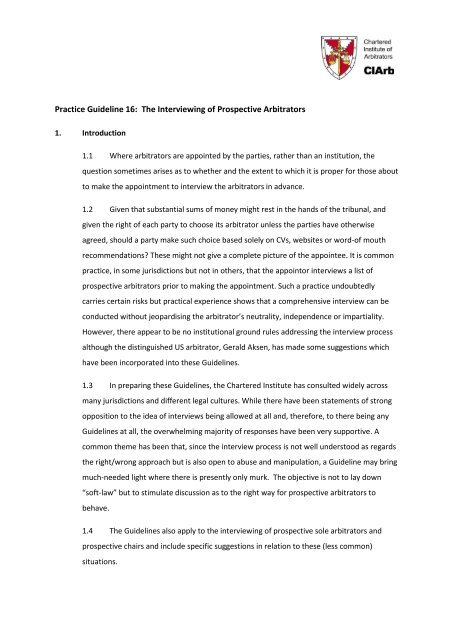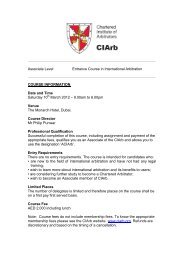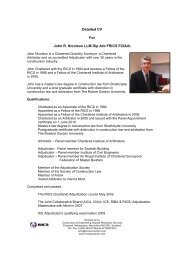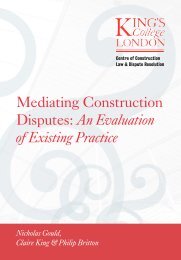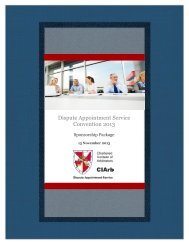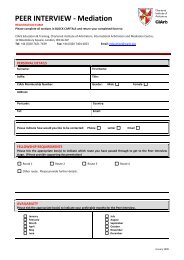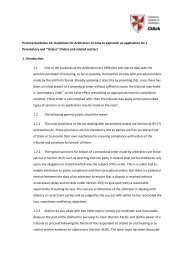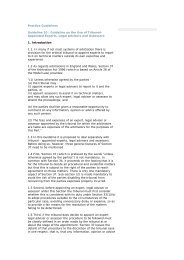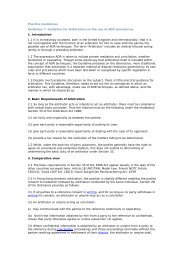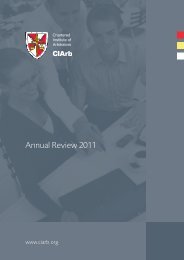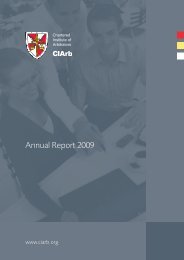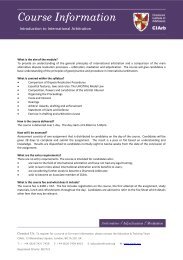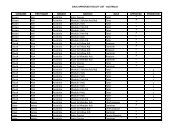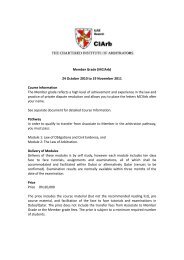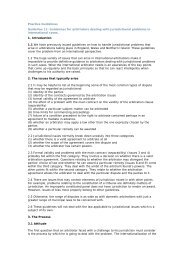Practice Guideline 16: The Interviewing of Prospective ... - CIArb
Practice Guideline 16: The Interviewing of Prospective ... - CIArb
Practice Guideline 16: The Interviewing of Prospective ... - CIArb
Create successful ePaper yourself
Turn your PDF publications into a flip-book with our unique Google optimized e-Paper software.
<strong>Practice</strong> <strong>Guideline</strong> <strong>16</strong>: <strong>The</strong> <strong>Interviewing</strong> <strong>of</strong> <strong>Prospective</strong> Arbitrators<br />
1. Introduction<br />
1.1 Where arbitrators are appointed by the parties, rather than an institution, the<br />
question sometimes arises as to whether and the extent to which it is proper for those about<br />
to make the appointment to interview the arbitrators in advance.<br />
1.2 Given that substantial sums <strong>of</strong> money might rest in the hands <strong>of</strong> the tribunal, and<br />
given the right <strong>of</strong> each party to choose its arbitrator unless the parties have otherwise<br />
agreed, should a party make such choice based solely on CVs, websites or word-<strong>of</strong> mouth<br />
recommendations? <strong>The</strong>se might not give a complete picture <strong>of</strong> the appointee. It is common<br />
practice, in some jurisdictions but not in others, that the appointor interviews a list <strong>of</strong><br />
prospective arbitrators prior to making the appointment. Such a practice undoubtedly<br />
carries certain risks but practical experience shows that a comprehensive interview can be<br />
conducted without jeopardising the arbitrator’s neutrality, independence or impartiality.<br />
However, there appear to be no institutional ground rules addressing the interview process<br />
although the distinguished US arbitrator, Gerald Aksen, has made some suggestions which<br />
have been incorporated into these <strong>Guideline</strong>s.<br />
1.3 In preparing these <strong>Guideline</strong>s, the Chartered Institute has consulted widely across<br />
many jurisdictions and different legal cultures. While there have been statements <strong>of</strong> strong<br />
opposition to the idea <strong>of</strong> interviews being allowed at all and, therefore, to there being any<br />
<strong>Guideline</strong>s at all, the overwhelming majority <strong>of</strong> responses have been very supportive. A<br />
common theme has been that, since the interview process is not well understood as regards<br />
the right/wrong approach but is also open to abuse and manipulation, a <strong>Guideline</strong> may bring<br />
much-needed light where there is presently only murk. <strong>The</strong> objective is not to lay down<br />
“s<strong>of</strong>t-law” but to stimulate discussion as to the right way for prospective arbitrators to<br />
behave.<br />
1.4 <strong>The</strong> <strong>Guideline</strong>s also apply to the interviewing <strong>of</strong> prospective sole arbitrators and<br />
prospective chairs and include specific suggestions in relation to these (less common)<br />
situations.
2. <strong>The</strong> legal literature and regulatory material<br />
2.1 In an area where there is no caselaw and almost no codification <strong>of</strong> standards, we<br />
have relied heavily on the modest amount <strong>of</strong> published material on the subject. Two early<br />
articles in the subject in the mid-1990s brought the subject <strong>of</strong> arbitrator interviews into the<br />
open. Pr<strong>of</strong>essor Andreas Lowenfeld, “<strong>The</strong> Party-Appointed Arbitrator: Some Reflections”, 30<br />
Tex. Int'l L.J. 59 at pages 61-62 (1995) and Doak Bishop and Lucy Reed, Practical <strong>Guideline</strong>s<br />
for <strong>Interviewing</strong>, Selecting and Challenging Party-Appointed Arbitrators in International<br />
Commercial Arbitration”, 14 Arbitration International 395 at pages 423-425. Two more<br />
recent general reflections on interviewing arbitrators can be found in N Blackaby and C<br />
Partasides, A Redfern & M Hunter, Law & <strong>Practice</strong> <strong>of</strong> International Commercial Arbitration,<br />
5 th ed 2009 at paras 4.69-4.71 and Gary Born, International Commercial Arbitration, Volume<br />
1, Wolters Kluwer 2009 at pages 1391-1394. Mark Friedman responded to the original<br />
publication <strong>of</strong> the guidelines in “Regulating Judgment: A Comment on the Chartered<br />
Institute <strong>of</strong> Arbitrators <strong>Guideline</strong>s on the interviewing <strong>of</strong> <strong>Prospective</strong> Arbitrators” *2008+<br />
Dispute Resolution International 288. Extracts from this material appears as an annex to<br />
these <strong>Guideline</strong>s. Copies can be obtained from the Institute.<br />
2.2 <strong>The</strong> ABA’s “Code <strong>of</strong> Ethics for Arbitrators in Commercial Disputes” (2004) and the<br />
IBA Rules <strong>of</strong> Ethics for International Arbitrators provide some guidance on communications<br />
between parties and arbitrators prior to the commencement <strong>of</strong> an arbitration. Canon III<br />
Paragraph B(1) <strong>of</strong> the ABA Code states as follows:<br />
"When the appointment <strong>of</strong> a prospective arbitrator is being considered, the<br />
prospective arbitrator: (a) may ask about the identities <strong>of</strong> the parties, and the<br />
general nature <strong>of</strong> the case; and (b) may respond to inquiries from a party or its<br />
counsel designed to determine his or her suitability and availability for the<br />
appointment. In any such dialogue, the prospective arbitrator may receive<br />
information from the party or its counsel disclosing the general nature <strong>of</strong> the dispute<br />
but should not permit them to discuss the merits <strong>of</strong> the case."<br />
<strong>The</strong> IBA Rules are similar. Rule 5.1 says:<br />
“… A prospective arbitrator … may … respond to enquiries from those approaching<br />
him, provided that such enquiries are designed to determine his suitability and<br />
availability for the appointment and provided that the merits <strong>of</strong> the case are not<br />
discussed. In the event that a prospective sole arbitrator or presiding arbitrator is
approached by one party alone, or by one arbitrator chosen unilaterally by a party…<br />
he should ascertain that the other party or parties, or the other arbitrator, has<br />
consented to the manner in which he has been approached. In such circumstances<br />
he should, in writing or orally, inform the other party or parties, or the other<br />
arbitrator <strong>of</strong> the substance <strong>of</strong> the initial conversation. “<br />
Rule 5.5 may also have an application to the question <strong>of</strong> hospitality and remuneration in<br />
connection with an interview. It reads:<br />
3. <strong>The</strong> <strong>Guideline</strong>s<br />
“No arbitrator should accept any gift or substantial hospitality, directly or indirectly,<br />
from any party to the arbitration. Sole arbitrators and presiding arbitrators should<br />
be particularly meticulous in avoiding significant social or pr<strong>of</strong>essional contacts with<br />
any party to the arbitration other than in the presence <strong>of</strong> the other parties.”<br />
3.1 <strong>The</strong> following guidelines are to be considered as recommendations and do not carry<br />
any implication <strong>of</strong> being mandatory. As with all the Institute’s <strong>Guideline</strong>s, they do not<br />
represent the minimum acceptable standards in any jurisdiction and it is not expected that<br />
they will be relied upon in Court as representing a standard against which the conduct <strong>of</strong><br />
arbitrators is assessed. <strong>The</strong> objective is to achieve two things. First, the Institute aims to<br />
stimulate open discussion as to how one handles a potential difficult situation. Secondly, for<br />
arbitrators wanting a framework in which to operate in this context, these guidelines can<br />
provide a degree <strong>of</strong> comfort and structure. However, failure to follow them in every detail is<br />
not grounds for the removal <strong>of</strong> an arbitrator or the setting aside or refusal <strong>of</strong> enforcement <strong>of</strong><br />
the award.<br />
(1) In agreeing to be interviewed, the prospective arbitrator should make the basis upon<br />
which the interview is to be conducted, whether it should be these <strong>Guideline</strong>s or something<br />
else, wholly clear and in writing to the interviewing party, its legal advisers, or both.<br />
See Bishop & Reed at 423 and Blackaby & Partasides at para. 4.70.<br />
(2) <strong>The</strong>se <strong>Guideline</strong>s may, by agreement, serve as the basis upon which the interview is to be<br />
conducted, with such additional restraints and safeguards, whether suggested by the<br />
interviewer or interviewee and as agreed between them in advance, as may be appropriate<br />
in individual circumstances.
(3) It should be clearly understood that appointment as arbitrator does not carry with it any<br />
obligations to the appointing party except the generally-accepted obligations <strong>of</strong> all<br />
arbitrators <strong>of</strong> ensuring (i) that (where provided for) an appropriate chair/presiding arbitrator<br />
is selected and (ii) that the parties’ arguments are given a fair hearing – this is wholly<br />
different from arguing a party’s case.<br />
(4) It is reasonable for the parties to interview prospective chairmen or sole arbitrators but<br />
such interviews should either be by the parties (or their legal advisers) jointly or, if by one <strong>of</strong><br />
the parties, be conducted only in the presence <strong>of</strong> the other or its representative. In any<br />
event, each party wishing to participate in the interviewing process should be given an equal<br />
opportunity to do so. Any other party should not unreasonably refuse to co-operate.<br />
See Blackaby & Partasides at para. 4.71.<br />
(5) <strong>The</strong> interviewee arbitrator should be permitted to be accompanied by a secretary or<br />
other assistant to take a note <strong>of</strong> proceedings.<br />
(6) <strong>The</strong> constitution <strong>of</strong> the interviewing team should be made known to the prospective<br />
arbitrator in advance and, at the outset <strong>of</strong> the interview, it should be made clear who will<br />
lead it and how it will be conducted. <strong>The</strong> interview should normally be led by a senior<br />
representative <strong>of</strong> the interviewing party’s external lawyers.<br />
See Lowenfeld at 62 and Blackaby & Partasides at para. 4.70.<br />
(7) Either a tape recording or a detailed arbitrator’s file note should be made <strong>of</strong> the<br />
interview and the tape or the file note disclosed to the other side in the dispute, and to the<br />
appointing body, at the earliest available opportunity.<br />
This has been criticised by Gary Born in International Commercial Arbitration, 2009 at page<br />
1393 as “not customary nor required and most practitioners would counsel against it”.<br />
Friedman suggests at pages 289-290 that “many practitioners … would abhor taping<br />
interviews as being intrusive, demeaning and perhaps even likely to provoke more litigation<br />
as disgruntled parties pore over every word in search <strong>of</strong> phrases they might pluck out to<br />
support a challenge. <strong>The</strong> alternative <strong>of</strong> detailed file notes is less controversial but may not<br />
accomplish the same kind <strong>of</strong> transparency as taping.”<br />
<strong>The</strong> use <strong>of</strong> taping or indeed even a detailed file note is not a legal requirement (nor are any<br />
other parts <strong>of</strong> these guidelines). This requirement has been attacked informally on similar<br />
lines by other practitioners as being excessive. However, in a situation where one party is in
some sense discussing the case with the arbitrator, he or she would be well advised to<br />
follow this precaution to avoid any risk <strong>of</strong> suspicion <strong>of</strong> impropriety. <strong>The</strong> view expressed here<br />
has an echo in the increasingly common requirements to tape potentially suspicious or<br />
sensitive financial transactions.<br />
(8) <strong>The</strong> mere fact <strong>of</strong> there having been an interview should not, per se, be a ground for<br />
challenge.<br />
(9) <strong>The</strong> following may not be discussed either directly or indirectly:<br />
(i) the specific facts or circumstances giving rise to the dispute<br />
(ii) the positions or arguments <strong>of</strong> the parties<br />
(iii) the merits <strong>of</strong> the case.<br />
As Friedman points out (at page 290), there is a consensus about (iii). However, the first two<br />
items are difficult because the interviewer is entitled to assess the arbitrator’s suitability for<br />
the appointment. That process, though, can amount to a probing <strong>of</strong> the specific facts or<br />
circumstances giving rise to the dispute. <strong>The</strong>re is, though, a distinction between asking<br />
questions designed to elucidate familiarity with a legal topic or a technical environment and<br />
a presentation <strong>of</strong> the facts <strong>of</strong> the case or the issues expected to arise and an enquiry as to<br />
the arbitrator’s views on them. It is acceptable to enquire as to the arbitrator’s knowledge<br />
<strong>of</strong> a particular area in dispute. It is not acceptable to enquire about his or views on it.<br />
<strong>The</strong> difficulties involved here may particularly justify the taping <strong>of</strong> the conversation to<br />
ensure that all parties know the extent <strong>of</strong> the probing that has occurred.<br />
See Lowenfeld at 61-62, Bishop & Reed at 424-425, Born at 1393, Blackaby & Partasides at<br />
para. 4.69, ABA Code & IBA Rule 5.1.<br />
(10) Subject to (9), in order for the interviewee’s suitability (expertise, experience, language<br />
pr<strong>of</strong>iciency and conflict status) to be assessed, the following may be discussed:<br />
(i) the names <strong>of</strong> the parties in dispute and any third parties involved or likely to be involved<br />
(ii) the general nature <strong>of</strong> the dispute<br />
(iii) sufficient detail, but no more than necessary, <strong>of</strong> the project to enable both interviewer<br />
and interviewee to assess the latter’s suitability for the appointment
(iv) the expected timetable <strong>of</strong> the proceedings<br />
(v) the language, governing law, seat <strong>of</strong> and rules applicable to the proceedings if agreed, or<br />
the fact that some or all <strong>of</strong> these are not agreed<br />
(vi) the interviewee’s experience, expertise and availability.<br />
See Lowenfeld at 61-62, Bishop & Reed at 424-425, Born at 1393, Blackaby & Partasides at<br />
para. 4.69, ABA Code & IBA Rule 5.1.<br />
(11) Subject always to the overriding provisions <strong>of</strong> (9), in assessing the interviewee’s<br />
experience and expertise, questions may be asked to test his or her knowledge and<br />
understanding <strong>of</strong><br />
(i) the nature and type <strong>of</strong> project in question<br />
(ii) the particular area <strong>of</strong> law applicable to the dispute<br />
(iii) arbitration law, practice and procedure.<br />
Such questions should be general in nature and neutrally put in order to test the interviewee<br />
and should not be put in order to ascertain his or her views or opinions on matters which<br />
may form part <strong>of</strong> the case.<br />
Questions concerning the interviewee’s publishing history (if any) may be put subject to the<br />
same proviso.<br />
See Lowenfeld at 61-62, Bishop & Reed at 424-425, Born at 1393, Blackaby & Partasides at<br />
para. 4.69, ABA Code & IBA Rule 5.1.<br />
(12) <strong>The</strong> interviewee should decline to answer any question on the grounds that it goes<br />
beyond what is categorized in (10) and (11) above, and this should be accepted in good faith<br />
by the interviewer.<br />
(13) Conversely, the prospective arbitrator should not ask any question <strong>of</strong> the interviewer<br />
that if asked by the interviewer would contravene (9) above.<br />
(14) In the event that the interviewee comes to the conclusion that the interviewer is really<br />
seeking a partisan arbitrator or one who will not be impartial, he or she should terminate<br />
the interview forthwith and should not accept the appointment.
Mark Friedman suggests as an alternative here that the candidate could just explain that he<br />
or she will not act “as a partisan and will remain independent and impartial”. It would then<br />
be for the appointing party to decide what it wants to do.<br />
While that is a reasonable point <strong>of</strong> view, such is the sensitivity <strong>of</strong> a private interview process,<br />
we prefer the original guideline. It is an open question as to how desirable it is to accept an<br />
appointment as an arbitrator from a party that is a expecting a “service” that the arbitrator<br />
cannot deliver.<br />
(15) <strong>The</strong> interview should be conducted in a pr<strong>of</strong>essional manner in a business location that<br />
is ideally the arbitrator’s <strong>of</strong>fice and is not in any event the interviewer’s premises, and not<br />
over drinks or a meal.<br />
See Lowenfeld at 62, Born at 1394, Blackaby & Partasides at para. 4.70, Born at 1394. See<br />
also IBA Rule 5.5.<br />
(<strong>16</strong>) A time limit should be agreed for the interview.<br />
See Bishop & Reed at 425.<br />
(17) Any failed interviewee may be reimbursed his or her reasonable travel expenses for<br />
attendance at the interview but should not be reimbursed for his or her time save in<br />
exceptional circumstances.<br />
(18) <strong>The</strong> appointee should not be reimbursed his or her travel expenses or time for<br />
attendance at the interview but, once the tribunal is constituted and arbitral proceedings<br />
under way, the appointed arbitrator should submit his or her travel expenses for<br />
reimbursement in the normal way but clearly separated and identified as relating to the<br />
interview.<br />
See IBA Rule 5.5.
Annex: Literature review<br />
1.1 Two early articles in the subject in the mid-1990s brought the subject <strong>of</strong> arbitrator<br />
interviews into the open. Pr<strong>of</strong>essor Andreas Lowenfeld, “<strong>The</strong> Party-Appointed Arbitrator:<br />
Some Reflections”, 30 Tex. Int'l L.J. 59 at pages 61-62 (1995) gave the first serious<br />
presentation on this subject.<br />
“Some years ago, at a conference on international arbitration, an eminent lawyer<br />
with great experience both as arbitrator and as counsel in major cases, said …. That<br />
counsel should never nominate an arbitrator without interviewing him or her first. …<br />
Not long thereafter, I received a call …. From a lawyer I know telling me <strong>of</strong> an<br />
important arbitration in which he had just been retained…. A few days later, the …<br />
lawyer called again, to say that he had passed my name on to this client, but that<br />
Mr. X, inside counsel for the client was coming to New York and would like to meet<br />
with me before making a decision. ..<br />
When Mr. X arrived – in my <strong>of</strong>fice – the conversation … soon … turned to the<br />
industry in which his company was engaged, though not the particular controversy.<br />
… Mr X had a right to find out for himself whether I was quick or dull, realistic or<br />
dreamy, a scholar mired in books or someone who understood or could be made to<br />
understand the ways <strong>of</strong> business. I was not uncomfortable when he asked me what<br />
other arbitrations I had been involved in, and who the counsel and the other<br />
arbitrators had been….<br />
If… one <strong>of</strong> the principal functions <strong>of</strong> a party-appointed arbitrator is to give<br />
confidence in the process to the parties and their counsel, some basis for that<br />
confidence needs to be established. Sometimes that confidence can be based on<br />
mutual acquaintances, without direct personal contact; some potential arbitrators<br />
become well-known through published writings, lectures, committee work or public<br />
<strong>of</strong>fice. Others are not so well-known and I understand that lawyers or clients or both<br />
want to have a firsthand look. I think, however, some restraint should be shown by<br />
both sides. …<br />
Discussion <strong>of</strong> the dispute in all but the most general terms – it involves claims under<br />
a patent, it has to do with commodities, or with negotiable instruments, or with<br />
claims for extras in a construction projection – should be avoided. … It is all right for<br />
the candidate to say, “I am familiar with the oil industry,” or “I am comfortable with
patent controversies” or “I have had experience with the law <strong>of</strong> Patria” but not “You<br />
will need a good expert”….<br />
1.2 In 1998, Doak Bishop and Lucy Reed provided a review <strong>of</strong> the rules and canons on<br />
the subject:<br />
“Pre-appointment interviews with prospective arbitrators are not per se forbidden<br />
or unethical, although some arbitrators will refuse an interview as unseemly.<br />
Although not prohibited, interviews are regulated to a certain degree by common<br />
sense, common practice and by the relevant codes <strong>of</strong> ethics.<br />
<strong>The</strong> AAA International Rules prohibit any ex parte communications between a party<br />
or its counsel and a prospective arbitrator except: (1) to advise the candidate <strong>of</strong> the<br />
general nature <strong>of</strong> the controversy and the anticipated proceedings, and (2) to<br />
discuss the candidate’s qualifications, availability or independence. … <strong>The</strong> IBA Ethics<br />
goes on to permit the potential arbitrator to respond to questions about his or her<br />
availability and suitability for the arbitration, but enjoins any discussion <strong>of</strong> the merits<br />
<strong>of</strong> the case with the appointing party or its counsel…<br />
Under the various rules and the general practice <strong>of</strong> international arbitration, it<br />
would be proper for a party, or its counsel, to raise and discuss the following matters<br />
in the initial interview with a potential arbitrator:<br />
(1) the identities <strong>of</strong> the parties, counsel and witnesses;<br />
(2) the estimated timing and length <strong>of</strong> hearings;<br />
(3) a brief description <strong>of</strong> the general nature <strong>of</strong> the case sufficient to allow<br />
the candidate to determine if he or she is competent to decide the dispute,<br />
has disclosures to make, and has the time to devote to the matter;<br />
(4) the arbitrator's background, qualifications and resume;<br />
(5) the arbitrator's published articles and speeches;<br />
(6) any expert witness appearances <strong>of</strong> the arbitrator, including positions<br />
taken;<br />
(7) any prior service as an arbitrator, including decisions rendered (subject<br />
to any confidentiality requirements);
(8) whether there is anything in the arbitrator's background that would raise<br />
justifiable doubts as to his or her independence or impartiality, and any<br />
disclosures that the arbitrator would need to make;<br />
(9) whether the arbitrator feels competent to determine the parties'<br />
dispute; and<br />
(10) the availability <strong>of</strong> the arbitrator (i.e., whether he or she can devote<br />
sufficient time and attention to the parties' dispute in a timely manner).<br />
It must be emphasized that in international arbitration practice, parties and their<br />
counsel should avoid any discussion <strong>of</strong> the merits <strong>of</strong> the case beyond a description<br />
<strong>of</strong> the nature <strong>of</strong> the dispute and the issues involved sufficient for the candidate to<br />
evaluate his or her competence, disclosures and time commitments. <strong>The</strong> description<br />
<strong>of</strong> the nature <strong>of</strong> the case and the issues should be stated in a neutral fashion,<br />
avoiding advocacy or misrepresentation <strong>of</strong> the opposing party’s position. Any<br />
questions, including hypothetical ones, about what position the prospective<br />
arbitrator might or would take on any <strong>of</strong> the issues in dispute between the parties<br />
should be strictly avoided.<br />
Certainly, the potential arbitrator should not express his or her beliefs or opinions<br />
on the merits <strong>of</strong> the dispute. As a matter <strong>of</strong> common sense, the more extended the<br />
interview, the more reasonable the assumption that the bounds <strong>of</strong> propriety were<br />
exceeded. <strong>The</strong> ICC Court refused to confirm a party-appointed arbitrator who spent<br />
approximately 50-60 hours with the nominating party reviewing the case before<br />
appointment. A slightly more difficult question is whether an appointing party can<br />
attempt to ascertain a potential arbitrator's general position in generic terms,<br />
meaning without reference to the facts <strong>of</strong> the specific case. For example, can the<br />
party ask a potential arbitrator his or her general views on enforcing a contract as<br />
written as opposed to application <strong>of</strong> the doctrine <strong>of</strong> changed circumstances? <strong>The</strong><br />
answer should be "no," although such views may sometimes be ascertained by<br />
reference to the potential arbitrator's writings, speeches, expert witness opinions,<br />
or positions taken in published arbitration awards.<br />
Some experienced international arbitrators who consent to interviews attempt to<br />
control the process by limiting the amount <strong>of</strong> time for the interview, by limiting the<br />
topics they will discuss consistent with those described above or by taking notes <strong>of</strong>
the interview and making the notes available to all parties. Of course, it should be<br />
made known in advance to the interviewer that the candidate will make notes <strong>of</strong> the<br />
interview, and those notes will be tendered to the other parties.”<br />
1.3 Two more recent general reflections on interviewing arbitrators can be found in<br />
Redfern & Hunter’s and Gary Born’s books.<br />
1.3.1 N Blackaby and C Partasides, A Redfern & M Hunter, Law & <strong>Practice</strong> <strong>of</strong> International<br />
Commercial Arbitration, 5 th ed 2009 says at paras 4.69-4.70:<br />
“It is common for counsel to draw up a list <strong>of</strong> prospective party-nominated<br />
arbitrators who are invited to interviews by representatives <strong>of</strong> party. A number <strong>of</strong><br />
eminent European arbitrators have declined to participate in such events on the<br />
grounds that they were at best demeaning, and at worst improper. However, it is<br />
hard to perceive the practice as being objectionable in principle provided that it is<br />
not done in a secretive way and that the scope <strong>of</strong> the discussion is appropriately<br />
restricted. In particular it is quite appropriate for a prospective arbitrator to be<br />
questioned in person on matters relating to the existence <strong>of</strong> conflicts <strong>of</strong> interest. In<br />
this regard, the candidate should be supplied with the name <strong>of</strong> the parties and<br />
counsel. He or she may also be questioned on their experience in the relevant field,<br />
qualifications for the case in hand, as well as availability. It is also reasonable for a<br />
party representative to have an opportunity to assess the candidate’s physical and<br />
mental health. However, there should be no probing <strong>of</strong> the prospective arbitrator’s<br />
views on the merits <strong>of</strong> the case, nor should party representatives take the<br />
opportunity to test their forthcoming submissions <strong>of</strong> fact and law.<br />
One distinguished US arbitrator has identified his own guidelines, having informed<br />
the interviewers <strong>of</strong> them in advance. First, other than in exceptional circumstances,<br />
the interviewers must travel to see him in his <strong>of</strong>fice (ie he will not respond to a<br />
‘summons’ to the premises <strong>of</strong> the party concerned or their representatives).<br />
Secondly, the interviewing delegation must be led by an external lawyer retained by<br />
the party in question (ie he will not see the party’s employees on their own.) Thirdly,<br />
the meeting should not be conducted over lunch or other event involving hospitality<br />
– regardless <strong>of</strong> who will pay the bill. Fourthly, the meeting should not last for more<br />
than half an hour. Fifthly, he will take a note <strong>of</strong> the discussion that he will regard as<br />
disclosable to interested parties if appropriate. Sixthly, if appointed, he will inform
the arbitrator nominated by the other party <strong>of</strong> both the fact and the content <strong>of</strong> the<br />
discussion with the party that appointed him. <strong>The</strong>se are eminently sensible<br />
guidelines that should avoid any real risk <strong>of</strong> impropriety; and prospective arbitrators<br />
would be wise to adopt a similar system, or to adapt them in a way that seems<br />
appropriate to the circumstances <strong>of</strong> individual cases.<br />
1.3.2 <strong>The</strong> authors deal also with the interviewing <strong>of</strong> sole or presiding arbitrators (at para<br />
4.71):<br />
“Again, there can be no objection in principle provided both parties’ representatives<br />
are present and the discussion is carefully controlled. <strong>The</strong>re is indeed much to<br />
recommend the practice since proceedings will at least start on a sound footing if<br />
the person who is to preside over the hearings commands the respect and<br />
confidence <strong>of</strong> both parties.<br />
1.3.3 Born writes <strong>of</strong> interviewing in International Commercial Arbitration, Volume 1,<br />
Wolters Kluwer 2009 at pages 1391-1394 says:<br />
“That term is a misnomer and mischaracterizes the process, by wrongly suggesting<br />
an inquiry into the arbitrator’s views on the substance <strong>of</strong> the dispute or on the<br />
issues which will be raised in the dispute; instead, discussions with a prospective co-<br />
arbitrator must be limited to the individual’s experience, availability, interest,<br />
compensation and, where the co-arbitrators have a role in selecting a presiding<br />
arbitrator, the constitution <strong>of</strong> the tribunal.<br />
<strong>The</strong> IBA’s <strong>Guideline</strong>s address the appropriate scope <strong>of</strong> contracts between a party<br />
and potential co-arbitrators.<br />
“the arbitrator *is not disqualified by, or required to disclose…. Initial contact<br />
… if this contact is limited to the arbitrator’s availability and qualifications to<br />
serve or to the names <strong>of</strong> possible candidates for a chairperson and did not<br />
address the merits or procedural aspects <strong>of</strong> the dispute.<br />
<strong>The</strong> IBA Ethics also permit the prospective arbitrator to “respond to enquiries from<br />
those approaching him, provided that such enquiries are designed to determine his<br />
or her suitability and availability for the appointment as arbitrator and provided tha<br />
the merits <strong>of</strong> the case are not discussed. Other sources, including a variety <strong>of</strong>
descriptions <strong>of</strong> customary practice and international arbitration rules are to the<br />
same effect.<br />
<strong>The</strong> foregoing contacts between parties and prospective co-arbitrators are<br />
important to the arbitral process and, with appropriate safeguards (including<br />
disclosure as to their existence and equal opportunities for both parties to have such<br />
contacts) do not undermine or taint that process. <strong>The</strong>y serve as a constructive and<br />
valuable form <strong>of</strong> quality control, to ensure that a co-arbitrator has genuine<br />
experience with arbitration or a particular substantive field, does not have relations<br />
with an adverse party or law firm, is actually available and interested in serving, and<br />
has the personal and intellectual abilities to function well on a tribunal.<br />
<strong>The</strong>se matters can (and should) be explored through other means (such as publicly<br />
available records <strong>of</strong> past cases and inquiries with others in the arbitration<br />
community), but there is usually no substitute for hearing things first-hand. In<br />
practice, it is striking how frequently unanticipated problems – conflicts, scheduling<br />
problems, lack <strong>of</strong> experience or interest and the like –only emerge after discussion<br />
with a prospective a co-arbitrator. It bears emphasis that one <strong>of</strong> the defining<br />
characteristics and attractions <strong>of</strong> the arbitral process is the parties’ ability to select a<br />
tribunal that will decide their dispute in a competent, expert manner (rather than<br />
relying on random selection <strong>of</strong> a national court judge) Essential to achieving this<br />
process is determining first hand, what a prospective arbitrator’s actual experience,<br />
commitment and availability are.<br />
Likewise, pre-dispute contacts perform the legitimate function <strong>of</strong> reminding the co-<br />
arbitrator <strong>of</strong> the seriousness <strong>of</strong> his or her mandate. … <strong>The</strong> immediacy <strong>of</strong> personal<br />
contact with counsel or a party serves to underscore the gravity <strong>of</strong> the co-<br />
arbitrator’s mandate, which is entirely appropriate and desirable.<br />
At the same time, it is important to ensure that the co-arbitrator’s obligations <strong>of</strong><br />
impartiality and independence are not compromised by contacts with the<br />
nominating party. As the IBA <strong>Guideline</strong>s provide, there may be no discussion <strong>of</strong> the<br />
merits <strong>of</strong> the dispute, other than a general description sufficient to allow the party<br />
and prospective co-arbitrator to consider issues <strong>of</strong> experience and suitability. In<br />
particular, there should be no “pleading” <strong>of</strong> the case by a party nor any indications<br />
(however subtle) <strong>of</strong> predisposition by the prospective nominee. As a rule, parties
and co-arbitrators should conduct themselves as if the other party were present<br />
during their discussion. Equally important, both parties must be aware <strong>of</strong> the<br />
existence <strong>of</strong> discussions between counsel and the co-arbitrators and have the<br />
opportunity to engage in such discussions.<br />
In addition to ensuring that the co-arbitrator’s impartiality and independence are<br />
preserved, it is also important not to appear to be partial. Although matters such as<br />
the location <strong>of</strong> discussions, or who pays for a meal or trip, can appear trivial, they<br />
should be treated with care and discretion. Parties should consider such matters<br />
from the position <strong>of</strong> their opponent, reviewing matters after a hypothetically<br />
unfavourable arbitral award. Elementary efforts to avoid needless suspicions, such<br />
as meeting in the co-arbitrator’s premises and avoiding any hint <strong>of</strong> financial<br />
contributions should be observed.”<br />
Mark Friedman responded to the original publication <strong>of</strong> the guidelines in “Regulating<br />
Judgment: A Comment on the Chartered Institute <strong>of</strong> Arbitrators <strong>Guideline</strong>s on the<br />
interviewing <strong>of</strong> <strong>Prospective</strong> Arbitrators” *2008+ Dispute Resolution International 288. Most<br />
<strong>of</strong> his comments deal with individual guidelines. So, they are discussed in the guideline text<br />
in that context. He makes some general points as well at pp. 288, 289 & 292-293:<br />
“It is generally considered permissible to explore a prospective arbitrator’s<br />
suitability, but not to engage him on the merits <strong>of</strong> the particular dispute; it is<br />
permissible to learn about the arbitrator’s approach and perhaps predispositions,<br />
but not to compromise his impartiality and willingness to decide based on the<br />
arguments and evidence….<br />
If these <strong>Guideline</strong>s were not followed – no time limit agreed, questioning by two<br />
lawyers with no apparent leader, meeting at [a] hotel lounge during an arbitration<br />
conference with refreshments served – should we understand that the interview<br />
process has been compromised and the prospective arbitrator is now prone to be<br />
biased? For many, it is the substance <strong>of</strong> the discussion that should matter, not the<br />
setting….<br />
It is not clear that there is a pressing need for regulation <strong>of</strong> the arbitration interview<br />
process. … How much damage can actually be done in a pre-appointment interview?<br />
Between… a lot happens that is likely to blunt the impact even <strong>of</strong> comments that go<br />
too far. .. An arbitration who believes in the process and the fundamental
equirement to remain impartial is unlikely to need detailed guidelines; one who<br />
does not … is unlikely to heed them… <strong>The</strong>re is some danger that prescriptive<br />
guidelines may fuel … challenges.”


